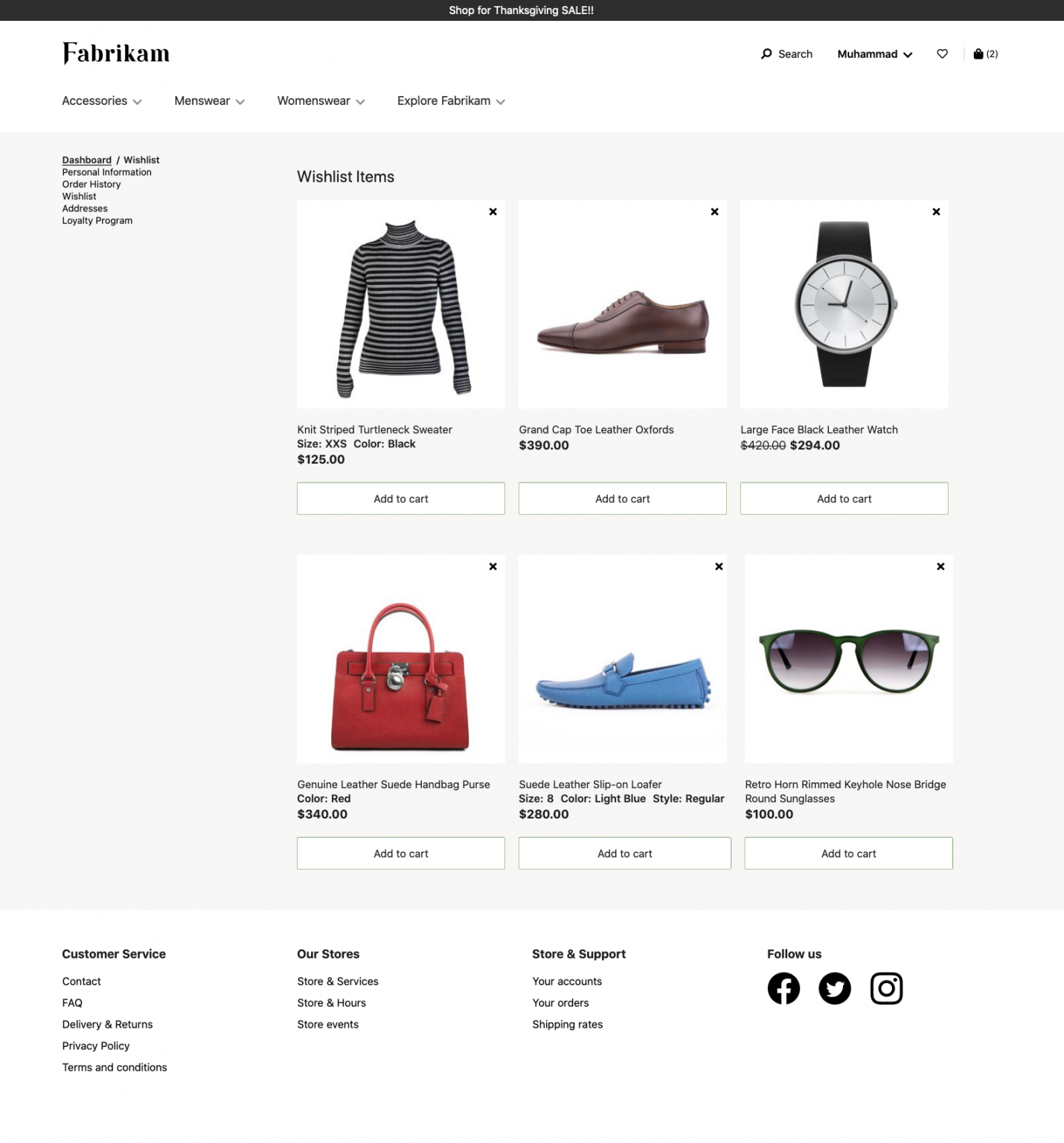
Listen to this blog
With retail rapidly evolving beyond the traditional transactional model, today’s customers want retail experiences that either meet or exceed their growing expectations. They expect a consistent, future-rich shopping experience, no matter which channel or device they use. For instance, customers might use their smartphones to pull up their personal wishlists as they walk through your store’s aisles looking for their favorite products. Microsoft Dynamics 365 Commerce delivers a unified customer experience by combining touchpoints across traditional and digital channels.
Read more: Seamless Localization Capabilities of Microsoft Dynamics 365 Commerce
To offer personalized, seamless shopping experiences, retailers must have a better understanding of their customers’ needs. According to Gartner, by the end of 2020, more than 40 percent of all data analytics projects will relate to an aspect of customer experience. Already, 43% of product managers at growth companies use analytics to collect and analyze customer perception and sentiment data, versus 22% of product managers at non-growth companies.
Dynamics 365 Commerce features like order history, wishlists, loyalty programs, and AI-powered recommendations help retailers track customer behavior across channels to paint a comprehensive view of users’ preferences. This enhanced understanding enables merchants to create experiences that maximize customer satisfaction and conversion. Let’s take a closer look at these features:
Order history
Customers can log into their account on your Dynamics 365 Commerce website and click on “Order History” to view all their online, in-store, and call center purchases, exchanges, and refunds in one place. They can view each order’s tracking number, shipping address, and payment information by clicking on the “View order details” button.
Dynamics 365 Commerce gives your Customer Care reps access to customers’ order history across all channels. Equipped with this information, they can provide quicker, more accurate, personalized customer service. For instance, if a customer calls your Customer Care team about a product they’re not satisfied with, the agent they speak to can quickly suggest a product that’s more in tune with their needs.
Your sales associates can also use customers’ order history to improve the quality of the service they provide. Knowing what a particular customer has bought in the past can help them understand that person’s preferences, which will result in more effective cross-selling and upselling.
For example, if customer is shopping for a travel suitcase, the salesperson can use the customer’s purchase history to get a feel for that person’s sense of style. Are their previous purchases loud and edgy, or minimalist and strait-laced? This may improve the sales associate’s chances of adding a neck pillow or a nametag to the sale. It’s also a great way to gauge a customer’s affinity for premium, mid-tier, or cost-conscious products without having to ask potentially sensitive questions about their budget.
Wishlists
Wishlists help you deliver a complete customer experience and can help improve conversion rates. When your customers see all their favorite products in one place, they are more likely to make quick purchase decisions.
Microsoft Dynamics 365 Commerce lets online shoppers add any of your products to a wishlist by clicking the heart icon on the product’s detail page. By clicking on “My Accounts” and then “Wishlist”, your customers can add wishlist items directly to their cart, or remove items from their wishlist.

With access to customers’ wishlists across all channels, your online store and your in-store sales associates can ask customers whether they want to buy wishlist items during checkout. Even if a customer decides not to buy a particular wishlist item, this information about your customers’ preferences is still extremely valuable. Your marketing and merchandising teams can use it to measure and improve their performance.
Loyalty
Loyalty programs help you stand out from your competition and reduce customer churn. However, managing loyalty programs separately for each retail channel is more complex, requires extra effort, and results in a sub-par customer experience. To consistently meet customer expectations, it’s important to ensure that your customers can earn and redeem their loyalty points using any digital or physical channel.
Microsoft Dynamics 365 Commerce makes it easy to create and manage omnichannel loyalty programs. If a customer has earned points from online purchases, those points can be redeemed in-store or vice versa. This results in more sales opportunities and higher customer satisfaction.
Dynamics 365 Commerce supports a wide range of loyalty options, including reward points, discount tiers, and loyalty cards. Retailers can use the platform’s sophisticated set of controls to set up and manage loyalty programs in numerous ways. You can issue or revoke loyalty cards, include or exclude eligible groups (like employees, veterans, or minors), and allow reward points to be used as a payment option. You can also offer “gold status” or “preferred customer” premium-tier rewards to frequent shoppers. This encourages customers to spend larger amounts with greater frequency.
Recommendations
Recommending relevant products to customers is a powerful way to increase your topline revenue and average order value (AOV). Microsoft Dynamics 365 Commerce can automatically recommend new arrivals and top-selling products to both online and in-store shoppers. The platform also auto-creates convenient collections of all new and popular products.
More interestingly, Dynamics 365 Commerce also applies sophisticated machine learning to purchases across all channels to recommend products that your customers commonly buy at the same time. So, the next time a customer adds a specific 4K TV to their cart on your electronics store’s website, the site might use historical sales to recommend a home theater system with a price tag and feature set that makes sense for that TV. It could even suggest essential Blu-Ray movies that are popular among budding 4K enthusiasts!
Dynamics 365 Commerce can also recommend products based on a particular customer’s purchase patterns. These recommendations appear on your online store as well as your in-store point-of-sale (POS) terminals. As an example, suppose a customer always purchases a complete outfit… jewelry, accessories, and all. The next time they add a blouse to their cart or take a pair of shoes to the cash register, Dynamics 365 Commerce could suggest a matching belt or earrings. Keep in mind, however, that online shoppers that check out as guests won’t see these personalized picks.
Dynamics 365 Customer Insights
Many organizations and companies extend the capabilities of Dynamics 365 Commerce using Dynamics 365 Customer Insights, an AI-infused solution that provides a 360° view of their customers’ actions and preferences. It brings together each customer’s transactional, observational, and behavioral data in real time to help retailers deliver personalized customer experiences.
Read more: Microsoft Dynamics 365 Commerce – Omnichannel Solution To Revitalize Your Business
Dynamics 365 Customer Insights can help your business optimize customer segmentation, identify a specific customer’s next best action, and personalize their promotional campaigns according to that customer’s preferences. You can connect customer data with Microsoft Power BI, gather insights from customized dashboards and reports, and formulate retention plans for customers at risk of churning. For instance, if a customer hasn’t shopped from your store in the past two months, you can send them an email or SMS and offer a discount on relevant products.
The perfect pairing of Dynamics 365 Commerce and Dynamics 365 Customer Insights helps people in many other job roles across the organization. Customer care reps can use a complete picture of customers’ purchase and support history to provide efficient, “one-and-done” customer service. Administrators will spend less time integrating data sources and managing duplicate customer records. Technical support managers will have an easier time identifying and resolving product and services issues. Your HR team will be able to quickly identify and address gaps in employee training.
Conclusion
Choosing Microsoft Dynamics 365 Commerce is a great way to capture a complete, omnichannel picture of your customers and provide seamless, out-of-the-box tools for keeping customers engaged, improving customer loyalty, and growing your topline revenue.
Visionet is a strategic Microsoft Dynamics 365 Commerce partner. Our proven expertise in digital commerce can help you deliver complete customer service. For more information, contact a Visionet expert.




